Thailand In Talks With Iran, Qatar To Release Hostages In Gaza
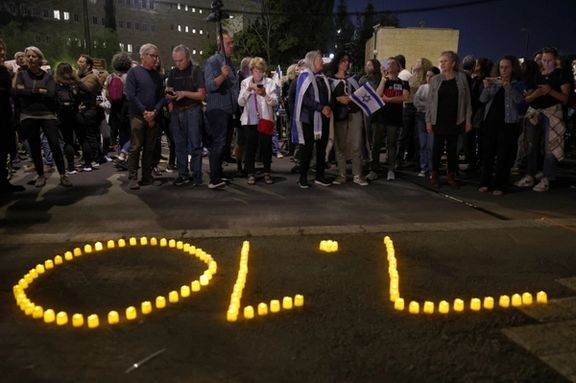
The Thai government is currently in discussions with Iran and Qatar to secure the release of 23 hostages held in Gaza, as reported by Hebrew media sources.

The Thai government is currently in discussions with Iran and Qatar to secure the release of 23 hostages held in Gaza, as reported by Hebrew media sources.
Thai citizens were killed and abducted during an assault on southern Israeli communities in a terror raid by Hamas on October 7. Foreign workers, many from Thailand, have long been employed in Israeli farms bordering Gaza, contributing to various agricultural tasks.
Thai Prime Minister Srettha Thavisin has assured that the hostages in Gaza are safe and will soon be freed. However, details regarding the negotiations and the mediators involved have not been disclosed.
Israeli Channel 12 reported on Monday that the Thai government recently made a donation of 3 million baht, equivalent to approximately $85,000, to the United Nations' agency for Palestinian refugees. Questions have risen regarding whether the donation is linked to the ongoing negotiations.
Channel 12 has also revealed that Iran is playing a pivotal role in the negotiations for the release of the captured Thai nationals. If an agreement is reached, the captives may be transferred to Egypt and then to Tehran before being repatriated to Thailand.
Moreover, Channel 12 showcased a photograph of a Thai delegation, led by the country's deputy prime minister, meeting in Tehran with Iran's Foreign Minister Hossein Amir-Abdollahian a few days ago.
During the October 7 onslaught, which marked the beginning of the Israel-Hamas war, 32 Thai citizens were killed, and 23 were abducted, according to official Thai government figures.
The toll from the attack resulted in the loss of approximately 1,400 lives, with the majority being civilians, and over 240 individuals kidnapped.
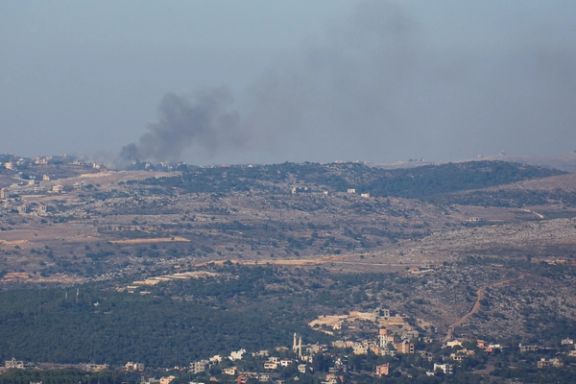
Since the leader of Iran-backed Hezbollah talked of multiple fronts of Middle East conflict, ignited by Hamas' October 7 attack on Israel, tensions are growing fast between Israel and Lebanon.
Hezbollah has been exchanging fire with Israeli forces across the border since October 7, when Hamas -- another Iran-funded militia – declared war on Israel in a multi-thronged terror attack codenamed al-Aqsa Flood (Storm in Persian) and killed over 1,400 mostly civilians and took at least 241 more hostages into the Gaza Strip. Since Friday, when Hassan Nasrallah broke his month-long silence on its Palestinian ally’s war with Israel, the conflict has become deadlier with more frequent bouts of fire.
On Saturday, Israeli warplanes conducted airstrikes along the border with Lebanon as the militant Hezbollah group attacked several Israeli army posts, including one that was struck with two large rockets. On Sunday, an Israeli civilian was killed when an anti-tank missile from Lebanon hit a vehicle near Kibbutz Yiftah in the Upper Galilee. Also on Sunday, a barrage of rockets launched from Lebanon landed in Kiryat Shmona, causing damage. Kiryat Shmona has been evacuated, along with dozens of other communities along the Lebanon border, due to repeated Hezbollah rocket and missile attacks. Earlier in the day, an Israeli airstrike reportedly killed four civilians in southern Lebanon.
On Monday night, Hamas militants in southern Lebanon fired some 30 rockets at Israel, triggering air-raid sirens in cities including Haifa, Nahariya and Acre. Several of the rockets were intercepted, while most fell in the Mediterranean Sea. Hamas claimed responsibility for the attacks, saying it “struck the occupied city of Nahariya and southern Haifa in northern occupied Palestine [Israel] with 16 missiles.”
The Israeli army on Tuesday said it hit two targets inside the Lebanese territory, including a military post of the Hezbollah group. An IDF tank targeted a terror cell preparing to launch an anti-tank missile towards Moshav Shtula. A “suspicious aerial target” was also prevented from entering Israel from Lebanon on Tuesday afternoon. The death toll of the Hezbollah fighters killed by the Israeli forces since October 8 has risen to 63, according to a statement by the group.
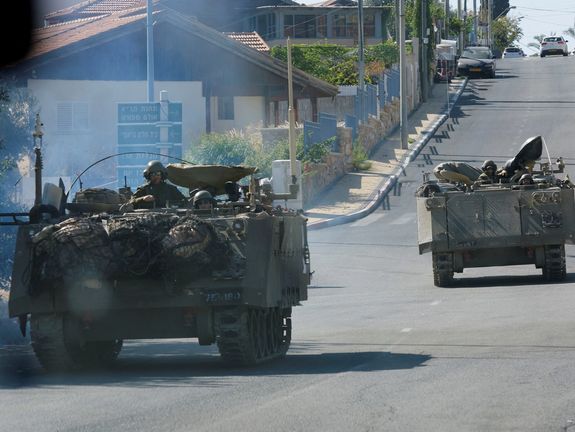
Although Nasrallah denied any involvement in the Hamas October 7 attack, he thanked all other Iranian proxy forces across the region for joining hands at the war against Israel. The al-Aqsa Flood battle has extended to more than one front, he said, adding, “We thank the Iraqi, Yemeni hands that joined this battle."
Iran's Revolutionary Guards founded Hezbollah in 1982, in the middle of Lebanon's 1975-90 civil war. It was part of Iran's effort to export its 1979 Islamic Revolution around the region and fight Israeli forces after their 1982 invasion of Lebanon.
Alongside continued calls for action against Israel from the top echelons of Iran's regime, Hezbollah has been escalating day by day, forcing Israel to keep its forces near the Lebanese border instead of the Gaza Strip and the West Bank. Nasrallah said in the televised address. "What's happening on the border might seem modest but is very important."
Iran and Hezbollah have been accused of full involvement in the planning of the October attack, with several public and secret joint meetings having been held since April in Beirut and Damascus. Interrogation of Hamas militants has revealed even the timing of the attack was coordinated with Tehran. Iran, along with Hezbollah has repeatedly threatened that the war will escalate to other fronts unless Israel halts its retaliatory offensive against Hamas in Gaza.
Lebanese pundit Bechara Khairallah told Iran International there is a kind of chaos in Hezbollah's leadership, especially because Nasrallah had promised to connect the battlefields but did not act on that promise. He underlined that Nasrallah’s halfhearted involvement in the war sparked by the October 7 attack showed that Hezbollah's primary allegiance is to the Islamic Republic, and Tehran's interests take precedence over the interests of Arab countries and the so-called Palestinian cause.
He also stressed that Hezbollah would not expand the conflicts in southern Lebanon since it is concerned about the severity of Israel's reaction. Despite the Lebanese people showing solidarity with Gazans, no one advocates for entering a war, and no political figure encourages Nasrallah to expand the war in Gaza, Khairallah noted.
Last week, Samir Geagea, the leader of Lebanon's biggest Christian party, the Lebanese Forces, called on Hezbollah to withdraw its forces from the south of the country, stating that “dragging us into the war would be a crime," the country already economically on its knees.
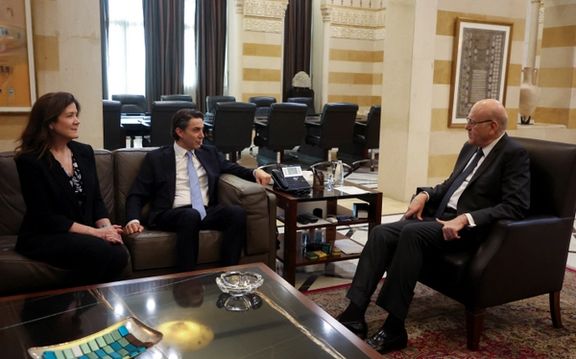
As the conflict between Israel and Hamas reverberates across the Middle East, the risk of war between Hezbollah and Israel remains higher than at any point since their last big conflict in 2006. In addition to sporadic clashes in the West Bank and multiple rocket and drone attacks against bases hosting US forces in Iraq and Syria, Hezbollah’s active engagement in the war can significantly change the landscape of the conflict.
However, Hezbollah has not yet unleashed its large missile arsenal against Israel or tried any incursions. According to the latest public estimates, Hezbollah has around 150,000 rockets and missiles, most with a reported range of a few dozen to hundreds of kilometers. On Thursday, The Wall Street Journal reported that Russia's Wagner mercenary group plans to provide Hezbollah with an air defense system, foreshadowing planning for a looming war.

Nasim Simiari, a political prisoner detained in Iran, has been held incommunicado in the women's ward of Evin Prison for six months.
Simiari faces a series of charges, including "collusion and conspiracy to act against the country's security, setting bombs in public places, and disrupting public order."
On May 18th, Simiari was taken into custody by Intelligence agents of the Islamic Revolutionary Guard Corps and transferred to a detention center within Evin Prison.
Following her arrest, authorities conducted a search of her residence, seizing personal belongings, including identification documents, mobile phones, a computer, money, gold, watches, and clothing belonging to her and her family.
After enduring two months of interrogation and detention in a separate cell, Simiari was moved to another solitary cell. A source close to Simiari's family revealed that prior to her transfer, she was coerced into a forced confession to camera.
Despite being transferred to the women's ward of Evin Prison in October, Simiari remains in detention without a court hearing or a verdict. It has been a recurring practice in the Islamic Republic to force detainees to provide forced confessions, subsequently leading to verdicts against political prisoners, a practice strongly criticized by human rights organizations.
Born in 1988 in Tehran, Simiari holds a degree in architecture and operated a women's beauty salon in Tehran before her detention. Her story underscores the ongoing concerns regarding human rights and due process in Iran's judicial system.
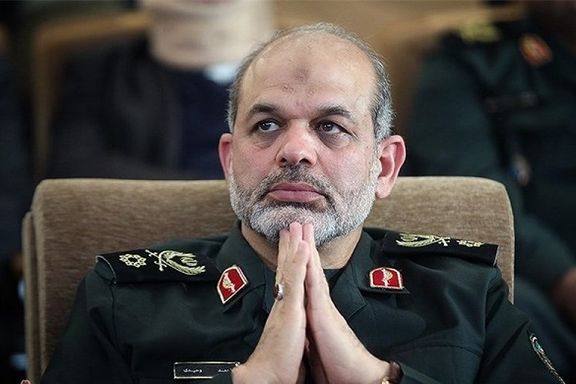
Iran's interior minister has appealed to the Taliban to take more measures to ensure Iran's water rights from the Helmand River, known as Hirmand in Iran.
The river plays a vital role in sustaining both Afghanistan and Iran, serving as a critical source for agriculture and drinking water. However, it has been a persistent source of tension between the two neighboring countries.
Iran has long accused Afghanistan of obstructing the river's water flow through the construction of dams, a claim vehemently denied by Afghan authorities.
During a Monday meeting with Abdul Ghani Baradar, the Deputy Prime Minister for Economic Affairs in the Taliban government, Ahmad Vahidi also engaged in discussions with a Taliban official on matters related to border security, counterterrorism, and creating conditions for the return of Afghan refugees, as reported by the IRNA state news agency.
Baradar, along with a 30-member delegation of Taliban officials, arrived in Tehran on November 4 and is expected to travel to other provinces in Iran, according.
Vahidi said during the meeting, "The issue of water casts a shadow on the medium-term and long-term plans of the two countries, and efforts must be made to resolve the problem."
Tensions regarding the Helmand River have persisted since the spring, and in early June, a clash between Iranian border forces and the Taliban resulted in the death of at least one Iranian soldier.
In the Taliban’s statement, it is said that Baradar requested that Iran release Afghan prisoners accused of minor crimes from prisons and transfer other Afghan prisoners to the Taliban government.
Iranian officials estimate that there are five million Afghans in Iran, with only 780,000 having refugee status, while the majority are undocumented. Some estimates even reach as high as eight million.
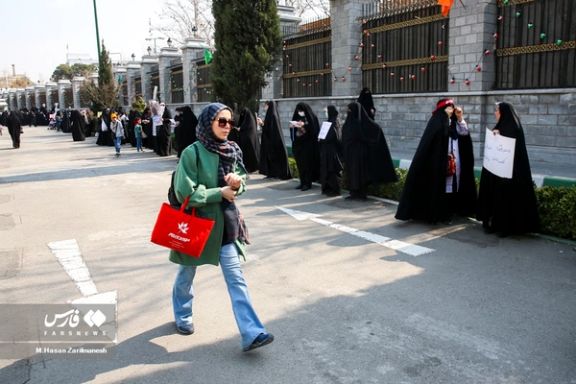
An official from Supreme Leader Ali Khamenei's office has tried damage control following remarks by a female hardliner, which risk alienating even regime supporters.
“This country belongs to Hezbollahis,” said Mansooreh Masoumi-Asl, an aspiring politician with close ties to the ultra-hardliner Paydari Party on live TV on Saturday. The context clearly indicated that she was demanding the total exclusion of all but her own party from the media and politics including other hardliners and conservatives.
Mehdi Fazaeil, a member of Khamenei’s office who has been responsible for publishing his writings for several years, responded to Masoumi-Asl by quoting Khamenei’s remarks about the revolution and those who “own” it.
“The Leader of the Revolution: This is a divine revolution, and its pillars are the people… No one, no group, can and should lay claim to owning this revolution …This revolution is owned by the people,” is a quote from a Khamenei speech in June 2008 that Fazaeli posted on X Monday evening read.
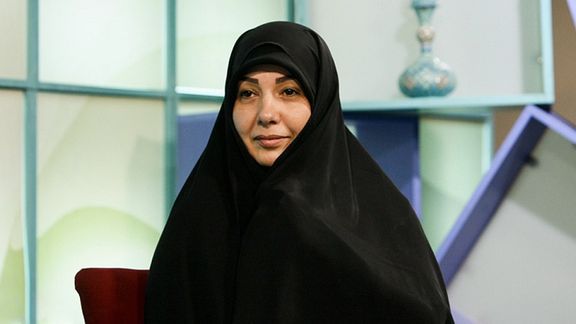
However, Khamenei had also said in a speech that the country belongs to hezbollahis, which seems to have been the inspiration for Masoumi-Asl’s statement two days ago.
“This country is the country of hezbollahis, and its future will be built by these hezbollahis and revolutionary and pious forces. Whenever a problem occurs, they should come and solve it. God willing, this will be the case,” Khamenei had said in September 1995.
The term "Hezbollah," originally employed to denote the Islamic Republic's revolutionaries in their struggle against perceived evil forces, has never held official political party status. In common usage, "hezbollahi" has evolved to describe fervent supporters of the regime and Supreme Leader Ali Khamenei.
Hezbollah and hezbollahi (belonging to Hezbollah) became part of the political jargon in 1979, when Islamist revolutionaries described themselves as hezbollahi against the liberal who were soon excluded from the government.
Masoumi-Asl, who is very active on social media and is often invited by the state broadcaster (IRIB) to comment on an array of topics, is a member of the central council of the Paydari-affiliated Strategic Network of Islamic Revolution’s Helper (SHARIAN). The group held its first general meeting in early March.
Iranian media say the group which includes many officials of President Ebrahim Raisi’s administration, as well as deputy parliament speaker Mojtaba Zolnour, seeks to oust the incumbent speaker of the parliament, Mohammad-Bagher Ghalibaf and his supporters in the upcoming March elections, and to take full control of the parliament.
The group’s activities have caused serious disputes between the Ghalibaf and the Raisi camps, Entekhab, a moderate conservative news website wrote Sunday.
“Our Iran is now at the center of a serious and dangerous development, and we witness a new episode of extremist behavior and deviations by hardliners. [They believe] whoever thinks differently should collect their things and get out [of the political scene],” Mostafa Faghihi, Entekhab’s chief editor, warned in a series of tweets.
Vahid Ashtari, an independent hardliner whistle-blower, tweeted that there are many theoreticians behind the phrase, ‘The country belongs to hezbollahis’ and several billions have been spent to promote this view. Many in power share this view, he said.
Ashtari who is an ardent supporter of the Islamic Republic but critical of most of the ruling cast and their corruption, also emphasized that limiting the criticism to Masoumi-Asl was “reducing the importance of the matter”.
“She will soon be given a good position [in the government] or become a lawmaker … She will mature a little bit and learn like others that she doesn’t have to say out loud everything that she believes in,” Ashtari wrote.
“Don’t mislead the people if you know where the roots of such a belief are and how it has affected policymaking, the money that has been spent, and the consequences it has had and tell the truth about this issue,” he added.
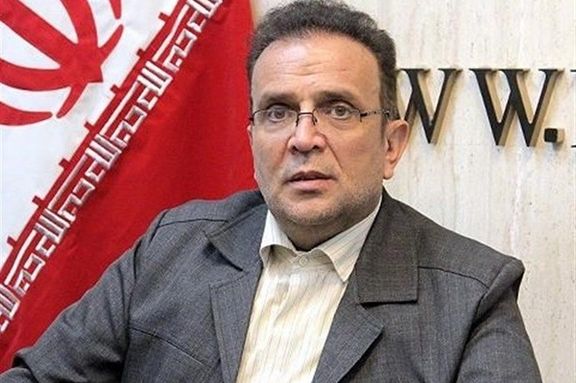
An Iranian member of parliament has voiced doubts regarding Supreme Leader Ali Khamenei's call to close off supply routes for oil and resources to Israel.
Mahmoud Abbaszadeh said that achieving the goal from “areas controlled by the Axis of Resistance may be unfeasible, and some regional reactionary countries might resist efforts to cut off oil and resources to Israel.”
Axis of Resistance is a term coined by the Islamic Republic to refer to its proxy forces in the region including, Palestinian militant groups, the Syrian regime, the Lebanese militant group Hezbollah and other factions.
Khamenei on Wednesday made an appeal to Muslim countries, urging them to halt oil and food exports to Israel, while demanding an immediate end to the bombings in the Gaza Strip.
"The bombings on Gaza must stop immediately ... the path of oil and food exports to the Zionist regime should be stopped," Khamenei told a group of students in Tehran, according to Iranian state media.
Israel, in retaliation for an attack on October 7 that claimed many lives and resulted in hostage situations, has vowed to take action against Hamas, which is backed by Tehran.
Iran is one of Hamas' biggest backers, supporting the group, proscribed by countries including the US and UK, financially and militarily.